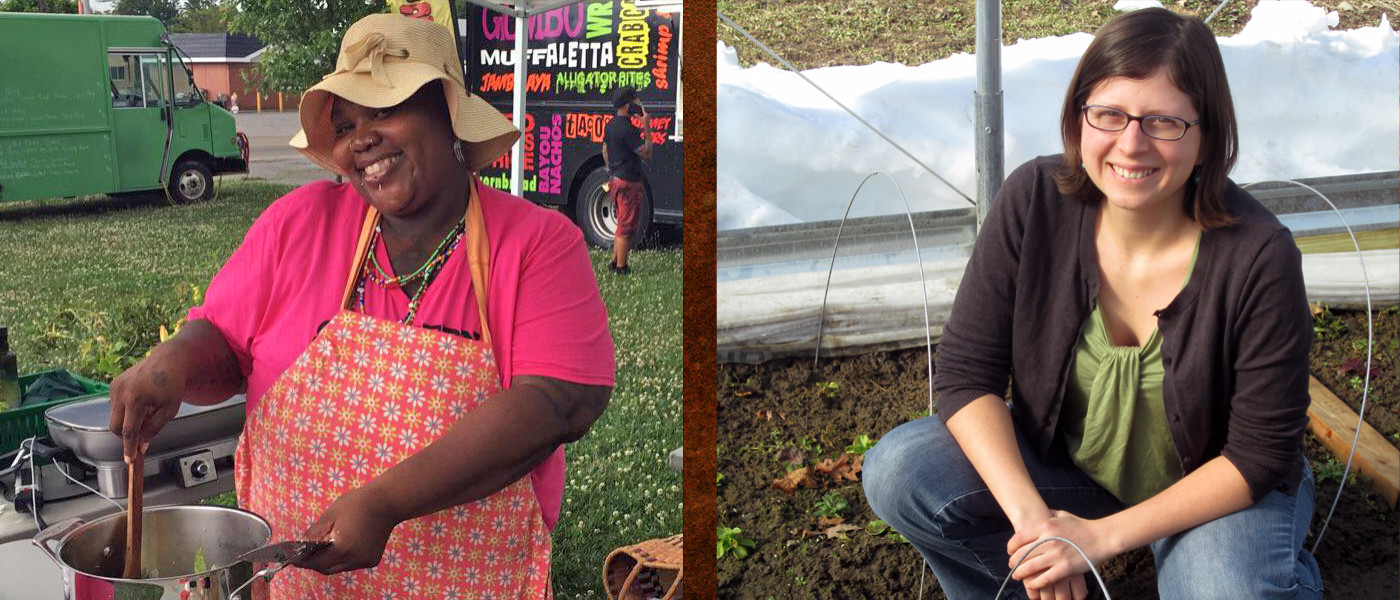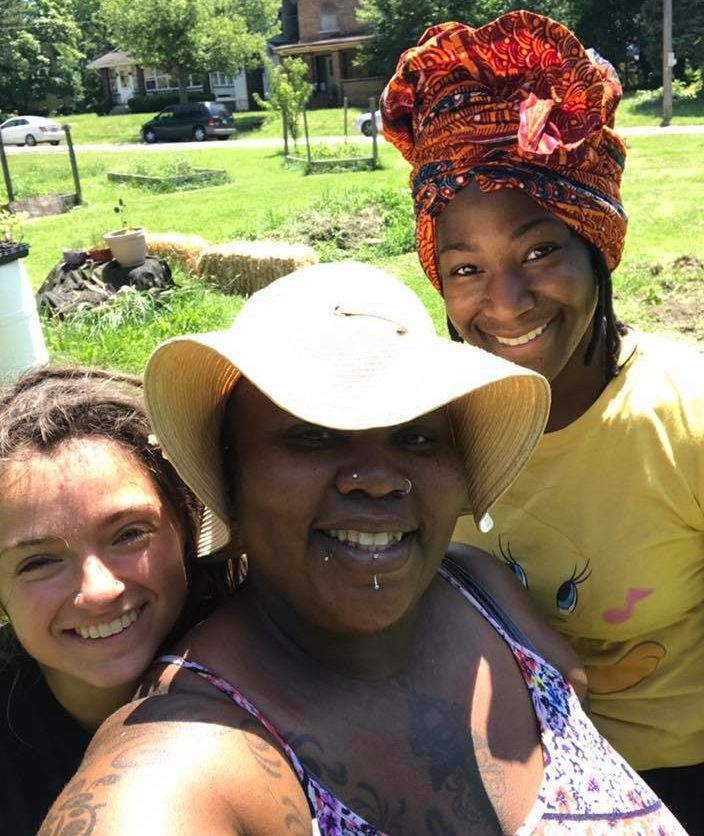Magical things are happening in Youngstown, Ohio, a city recovering from the loss of industry and looking for a fresh start. It’s a unique city, one with a strong gardening culture. As Farmer Hero Corey Maizel noted, the great location and reasonable real estate costs make it an ideal spot for farmers to start new businesses. To learn more about the exciting agricultural endeavors happening there, we talked with Liberty Avila of the Youngstown Neighborhood Development Corporation (YNDC) and Sophia Buggs of Lady Buggs Farm. Both are important champions of the local food movement.
YNDC was founded in 2009 to revitalize the community. Not only do they renovate houses to make them available for sale and rent, they also provide business consulting for local entrepreneurs, run a local farmers market, and repurpose vacant land for community use, among other initiatives. With dedication and hard work, they are leading the effort to make Youngstown a thriving, welcoming place. Liberty, YNDC’s Land Reuse Director, was instrumental in the establishment of their urban farm, Iron Roots Farm, and continues to manage their CSA program.
About a mile and a half down the road is another inspiring effort. Sophia Buggs started Lady Buggs Farm after inheriting her grandmother’s house on the South Side of Youngstown. Cultivating an urban farm was just an idea until her internship at YNDC’s Iron Roots helped to make it into a reality. Now in its seventh year, Lady Buggs Farm leases additional land from the Mahoning County Land Bank and grows produce and herbs on plots that adjoin Sophia’s house. With her daughter Passion’s help, Sophia is transforming her city.
Farm Aid was fortunate to interview Liberty and Sophia together, picking their brains about their farms and the city. We have condensed and edited this conversation into an annotated interview, combining narrative and dialogue.
On the History and Future of Youngstown
LIBERTY: Youngstown was once a very thriving community. When the steel mill shut down in the late 1970s, we experienced a significant population decline, similar to other places in the Rust Belt. Currently there are 23,000 vacant lots and about 40 percent of the city is empty.
SOPHIA: Youngstown is definitely ripe. It’s ready. When Lady Buggs Farm initially started growing for profit, there weren’t many markets here. Now there are markets everywhere. There is definitely demand for nutritious, local food.
In these abandoned and vacant spaces, I totally can see people doing things like mushrooms, compost, or worm farms. It takes the right kind of person with the right kind of resilient spirit to do it. This is a great place to start a small business because of low overhead costs. It can happen, but it’s not going to make you rich overnight.
I’m hoping that’s what takes hold rather than some corporation taking over the vacant plots and pushing us out. I’m hoping that the locals push to preserve green space.
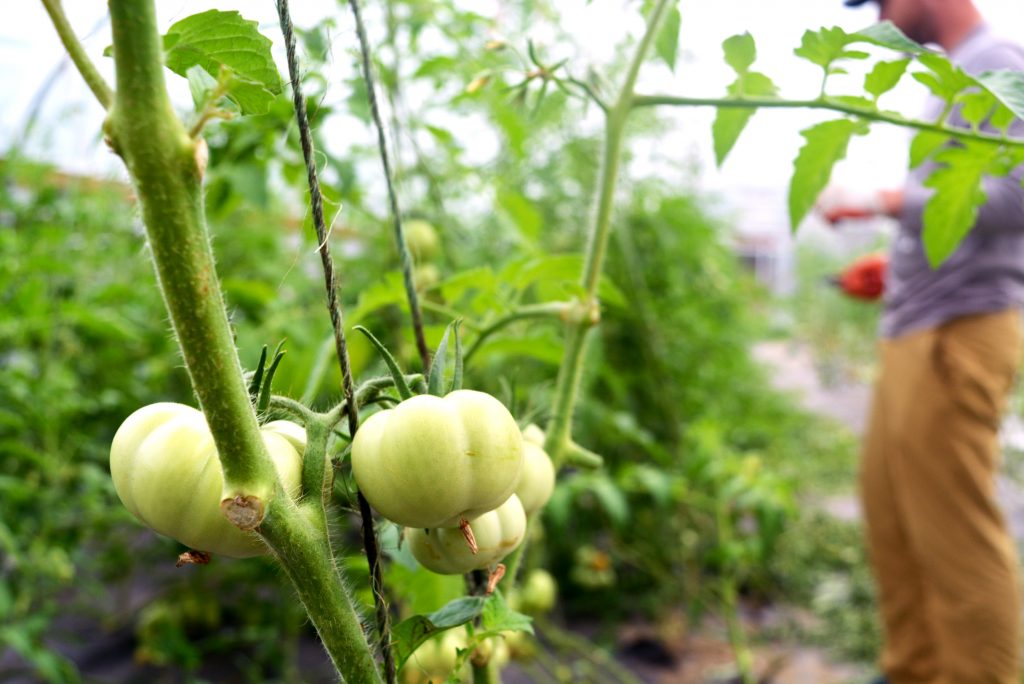
On How Iron Roots Got Its Start
LIBERTY: I gardened when I was a kid, but it felt like a chore that we had to do and not something that I was excited about. When I was older, I got into food and worked at some restaurants and some small farms in eastern Oregon near my hometown.
I came out to Slippery Rock University to get my Masters of Science in Sustainable Systems. While I was here, I became fascinated by all this vacant land… Two months after YNDC was established, I got an internship here. It was an exciting summer. We cleaned up vacant lots, rehabbed houses, and organized community workdays. We opened four community gardens that summer. I was hired full time the next year, the beginning of 2011. I didn’t necessarily expect to stay. I thought I’d be heading back to eastern Oregon, but I’ve been here for seven years now.
SOPHIA: Got ‘er! [laughs]
YNDC purchased the Iron Roots Farm property in 2011. When they first acquired it, the 1.7 acres was in poor shape with a dilapidated house. Once the property was fixed up and a garden was installed, the entire YNDC staff headquarters was moved there. Now, the property is always teaming with activity. During their busy summers, there can over fifty YNDC employees who work on the property. School groups come by as well, learning about cooking and doing plant identifications in the farm.
The farm is located on the South Side of Youngstown, on Canfield Road. Its placement is important, as it’s the first thing that many commuters see when they make their way into the city. Its success has become symbolic for the neighborhood, and a point of pride.
SOPHIA: Farmers look at spreadsheets and use business models to tell whether or not they’re financially sustainable and if they’re working. But if you could see what I see when I turn that corner from Glenwood Avenue to Canfield Road, it’s like, “Wow!” It’s a high-profile area and Iron Roots brings a quality and beauty to it. I’m not quite sure what the numbers are, but I can tell it has created such a huge impact on this community. They are winning.
As Sophia knows well, Iron Roots does more than just grow food for their sixty CSA members. They also provide job and apprenticeship training to locals interested in gardening or farming. Their mentorship was instrumental in helping Sophia start Lady Buggs Farm.
In 2014, Iron Roots launched a farmers’ market, which has become incredibly popular, both with farmers and community members. Sophia has been both a vendor and a customer there. At the market, she and other folks can benefit from Double Up, a program that doubles the purchasing power of SNAP dollars. YNDC is especially proud of that program, noting that it helps both farmers and customers alike. Youngstown is a ‘food desert,’ meaning that many locals struggle to find fresh food without traveling multiple hours to suburban grocery stores [see this local news story on the issue, where Liberty is quoted]. That makes the Double Up program and local farmers’ market extraordinarily importance.
On How Lady Buggs Farm Got Its Start
SOPHIA: Not to toot my own horn, but I think I’m one of the greatest examples of a YNDC project. I’m front and center for vacant land reuse projects and the local food movement. I’m redesigning the neighborhood, increasing confidence in the city, and keeping dollars in the local neighborhood. I am a farmer who is benefitting from the Double Up program.
I was born and raised here in Youngstown. My mother took me to central Florida when I was a little girl because there were no jobs here, but we would come back to visit. About seven years ago, I decided to come back home to Youngstown and figure life out. When I returned, I discovered that I’d inherited my grandmother’s home on the South Side.
Farming is in my blood. When I was little, I gardened with my grandmother. Her parents had a garden too. My mother’s first job in Florida was working in a greenhouse. So growing is definitely in my blood. I didn’t really discover that until I moved back to Ohio.
Sophia had heard about YNDC from all the work they were doing in her neighborhood, and met Liberty when she started getting involved in local gardening efforts. Once she decided to start her own farm, Sophia started tapping into all the resources that YNDC had to offer.
She completed an AmeriCorps Vista position, an internship program, and a market gardening training course with YNDC. In order to make her farm dreams come true she has been the recipient of a microloan, and two grants. Partnering with YNDC did not stop once Lady Buggs Farm was established in 2014. Sophia teaches cooking classes at their demonstration kitchen, sells produce at the farmers’ market, and makes value-added products at their community kitchen.
LIBERTY: It has been awesome having Sophia here; we hire her all the time for cooking classes. We just had the city youth summer programs come out. Sophia taught the classes and we did a farm tour with the kids. It’s just a great partnership. Sophia has all this awesome farming knowledge and cooking knowledge to give. The kids light up when they get to go see Sophia.
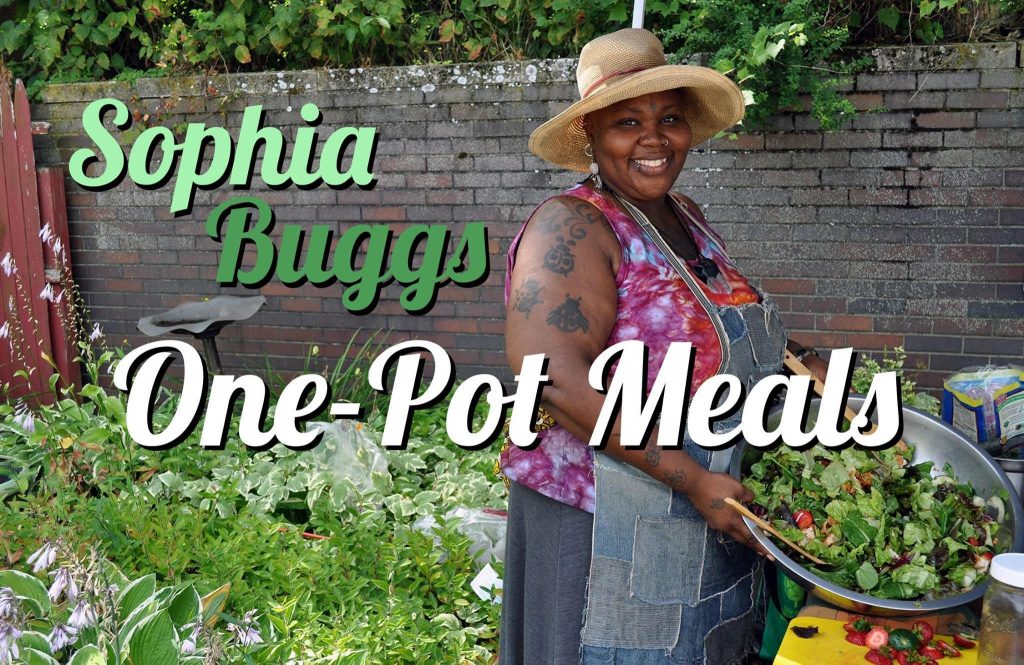
SOPHIA: It’s a really strong partnership that we have. I’m very grateful for YNDC because I wouldn’t be a business without them.
On the Partnership Between Lady Buggs Farm, YNDC, and Other Local Organizations
SOPHIA: Any time I go to conferences to speak, I can see that I’m making the wheels in peoples’ heads turn. What we have discovered is that there are a lot of cities with small food businesses down the street from each other and they don’t communicate. So this, here, is unique.
YNDC makes sure to reflect the neighborhood. It is special and I’m for sure grateful for it. They double check to make sure that the voices of the people who live here are being heard and included. It’s unfortunate that it’s not always able to happen that way.
LIBERTY: The great thing about Youngstown is that we do have all these partners on board with making sure that these projects happen. We have the Mahoning County Land Bank, which gets vacant land and leases it to projects. That’s one thing that’s pretty exciting about being here. There is a fair amount of support here, maybe not from every person or every neighbor, but there is a lot of support.
On the Challenges of Urban Farming in Youngstown
LIBERTY: One of the biggest challenges is not having a very developed market. You go to larger farmers markets in more affluent places and you might make three hundred or five hundred dollars or even more. Here, any vendor, even if they’re bringing a lot of product, might make between one hundred and two hundred dollars. It isn’t sustainable for the amount of hours it took to get there, forget actually growing the produce. Right now, there’s a big disconnect between affordability for the community and sustainability for the farmer. We’re trying to bridge that through our incentive programs. We’re working on expanding those, but there’s a long way to go. And groundhogs—they are a huge challenge too!
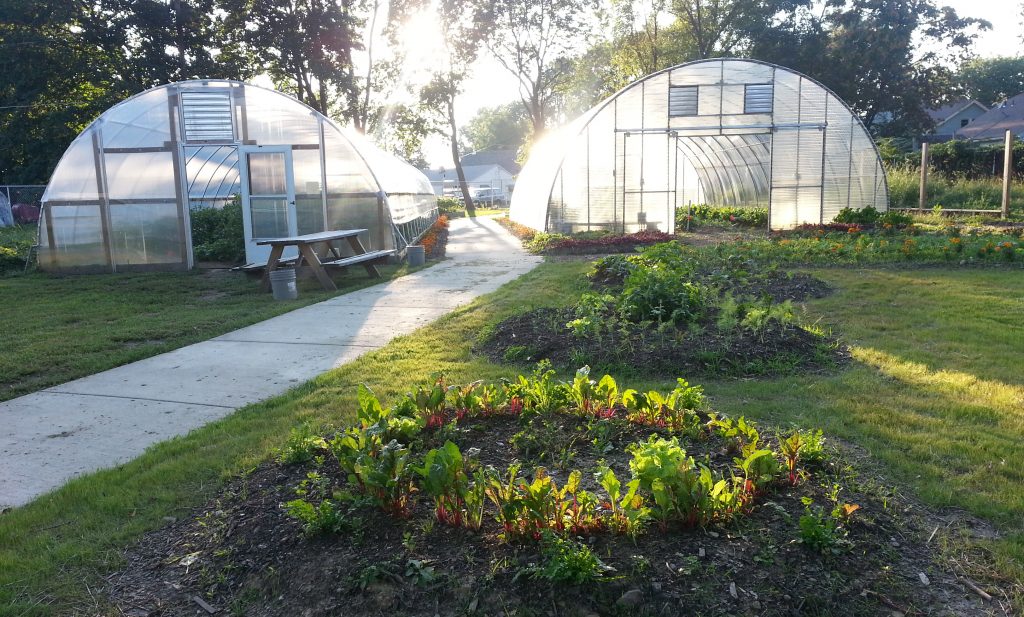
SOPHIA: I just pray and hope that my produce makes it to market and into my belly and that I’m able to choose to share it with who I want to. That’s a challenge: making sure you grew enough for everybody to eat. I’m trying to look at my farm model from a much more spiritual, rather than business, perspective. It’s not so much how many dollars I’m making, but how I’m able to impact my life and Youngstown. I want to be a good farm neighbor to folks who are coming back and trying to take advantage of rebuilding this city.
Fortunately, neither farm has had significant issues with lead contamination in their soil. Testing soil health is a necessity for any urban grower. Both farms grow on land that has not had structures on them recently. Lead is a rampant problem in Youngstown. Local children often play on abandoned lots, where their exposure is not monitored. YNDC is running a study on lead contamination on vacant lots. They take samples from plots around the city, and the results have been “distressing.”
